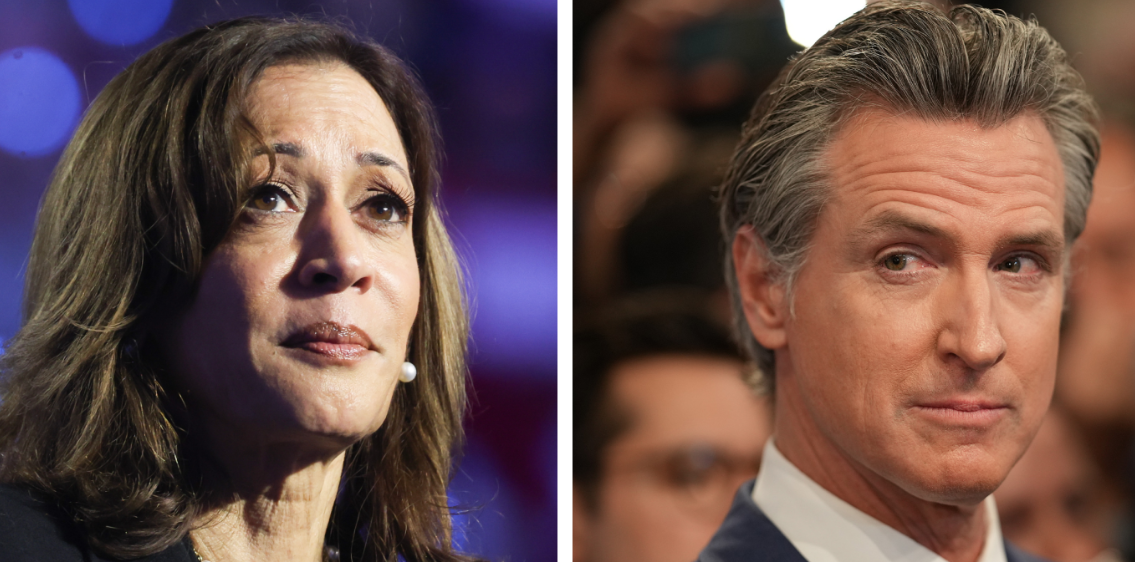Potential 2028 Democratic Presidential Contenders Already Taking Swipes At Each Other

The Democratic Party is struggling to regain its footing ahead of the next presidential election, but internal divisions are making that challenge even greater.
California Gov. Gavin Newsom, widely seen as a top contender for the party’s nomination, is facing criticism for inviting MAGA Republican radio host Steve Bannon onto his new podcast.
One of the first Democrats to criticize Newsom for this move was Kentucky Gov. Andy Beshear, another potential candidate for the nomination.
“Newsom bringing on different voices is great, we shouldn’t be afraid to talk and to debate just about anyone,” he told Politico. “But Steve Bannon espouses hatred and anger, and even at some points violence, and I don’t think we should give him oxygen on any platform, ever, anywhere.”
Despite the attention on Newsom and Beshear, recent polls indicate that both remain behind former Vice President Kamala Harris and slightly trail former Transportation Secretary Pete Buttigieg.
Buttigieg made a significant political move this week by confirming that he will not pursue Michigan’s open U.S. Senate seat, a decision that many believe clears the way for a 2028 presidential run.
Previously, Buttigieg had suggested he was “looking” at the possibility of replacing retiring Democratic Sen. Gary Peters in what will be one of the most contested races in the 2026 cycle. However, he has now stated that he has “decided against competing” for either governor or senator.
“I care deeply about who Michigan will elect as Governor and send to the U.S. Senate next year, but I have decided against competing in either race. I remain enthusiastic about helping candidates who share our values – and who understand that in this moment, leadership means not only opposing today’s cruel chaos, but also presenting a vision of a better alternative,” he wrote on X.
“While my own plans don’t include running for office in 2026, I remain intensely focused on consolidating, communicating, and supporting a vision for this alternative. The decisions made by elected leaders matter entirely because of how they shape our everyday lives – and the choices made in these years will decide the American people’s access to freedom, security, democracy, and prosperity for the rest of our lifetimes,” he continued.
According to Politico, a source familiar with Buttigieg’s decision indicated that his supporters see this as a strategic move to enhance his prospects for a future presidential bid, avoiding difficult contests in 2026 and 2028.
“The hardest decision in politics is to pass on a race you have a very good chance to win. Pete was an A-list recruit and would have been a formidable candidate for the Senate had he chosen to run,” veteran Democratic strategist David Axelrod told Politico.
Axelrod also pointed out that winning the Senate seat in 2026 would “almost certainly” remove Buttigieg from the 2028 presidential conversation.
“This certainly keeps that option open,” Axelrod added.
At this moment, Buttigieg trails only Harris in the 2028 Democratic primary race. However, Harris herself is weighing a different political opportunity.
Reports suggest that Harris is contemplating a gubernatorial run in California in 2026. According to Politico, two sources familiar with her thinking indicate that she is expected to make a decision on her future plans by the end of the summer.
Meanwhile, in Michigan—a critical swing state won by President Donald Trump last November—Democrats are scrambling to find a replacement for the departing Sen. Peters. Buttigieg, who moved to Michigan in 2022 with his husband Chasten, had been considered a strong contender.
Following Buttigieg’s announcement that he would not run for Senate or governor, political analyst Mark Halperin commented on how Buttigieg’s personal characteristics might impact his presidential aspirations.
On “The Morning Meeting,” Halperin suggested that Buttigieg’s stature and sexual orientation could influence his chances in a Democratic primary.
“Gotta say it — he’s short and gay. So you can say winning the nomination, being short and gay, is a positive. And for some people, maybe not short, but gay is a positive,” Halperin said. “And I know for some people there is, but there is going to be a premium for the party in 2028 on winning, right? It’s just like ’92. There are going to be a lot of voters who are willing to swallow stuff in order to win.”